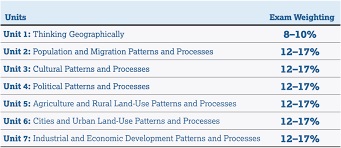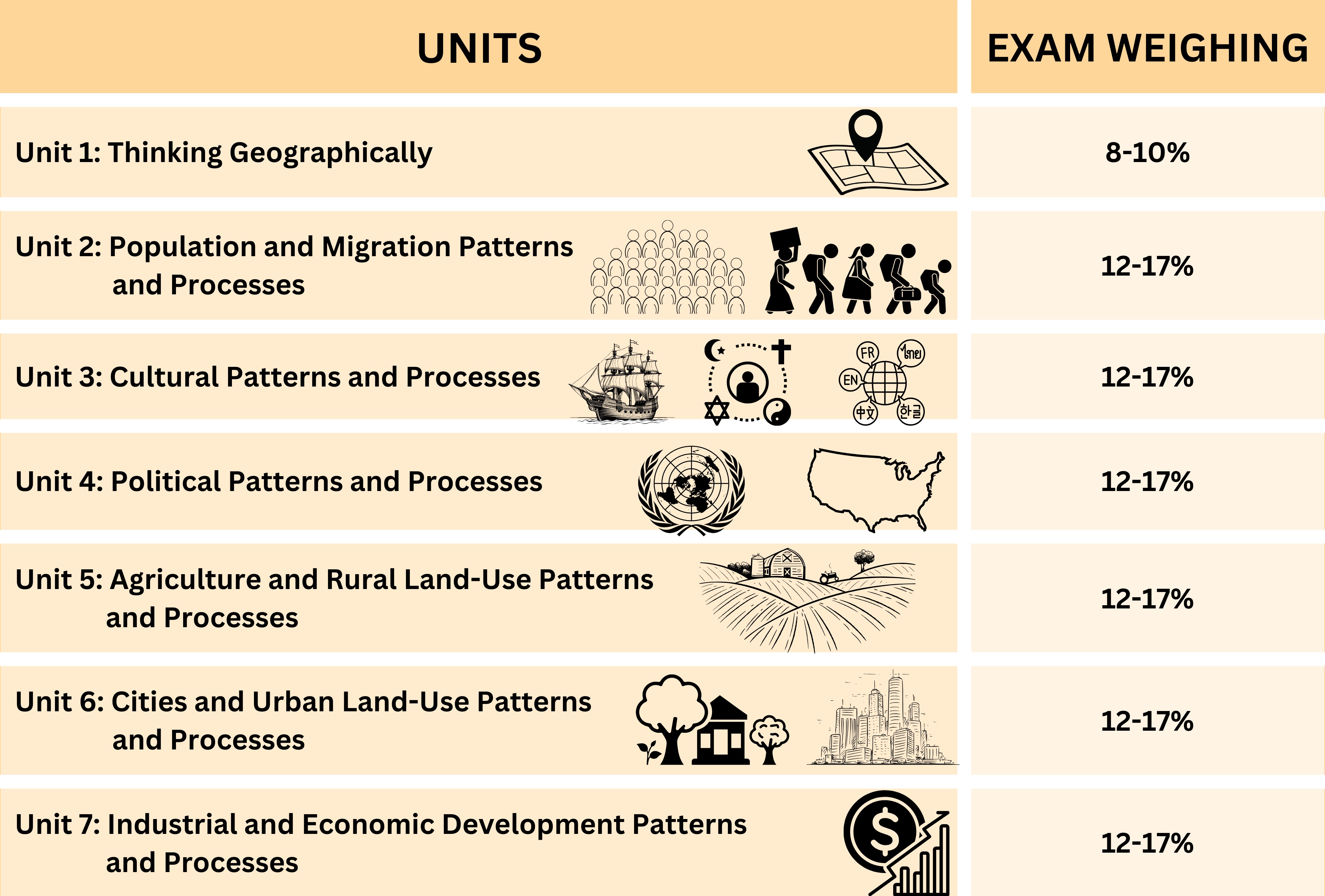
AP Human Geography Exam Overview
The AP Human Geography Exam assesses your understanding of the concepts, theories, and methods you’ve learned throughout the course. The exam is designed to test your ability to apply geographic concepts to real-world scenarios and demonstrate a comprehensive understanding of human geography topics, from population patterns to cultural processes.
The exam is divided into two main sections:
- Multiple-Choice Questions (MCQs)
- Free-Response Questions (FRQs)
Exam Format
-
Multiple-Choice Section (50% of Exam Score)
- Number of Questions: 60 questions
- Time Limit: 1 hour
- Question Types:
- The MCQs will test your knowledge of geographic concepts, data interpretation, and geographic processes.
- Questions will cover all major course topics (e.g., population, culture, political geography, economic development, urbanization, etc.).
- Some questions will involve interpreting maps, graphs, and other visual data.
-
Free-Response Section (50% of Exam Score)
- Number of Questions: 3 questions
- Time Limit: 1 hour and 15 minutes
- Question Types:
- These questions require written responses and will test your ability to explain, analyze, and apply geographic concepts.
- You may be asked to interpret data, provide examples, and discuss geographic patterns and processes.
- One of the questions will involve interpreting a map, graph, or data set and writing a response based on it.
- You will need to structure your responses clearly, using evidence from the course material to support your arguments.
Scoring Guidelines
-
Multiple-Choice Section: Each correct answer earns a point, and incorrect answers or unanswered questions receive no points. No penalty is given for incorrect answers, so it’s better to guess than to leave a question blank.
-
Free-Response Section: Your responses will be scored based on how well you address each part of the question, the clarity of your explanations, and the depth of your analysis. Rubrics will assess the organization of your response, the use of appropriate geographic terms, and the accuracy of your examples.
Key Topics Tested on the AP Human Geography Exam
-
Geography: Its Nature and Perspectives
- Geographic tools (maps, GIS, remote sensing)
- Spatial concepts (scale, space, place, region)
- Human-environment interaction and sustainability
-
Population and Migration
- Population distribution and density
- Demographic transition model (DTM) and population pyramids
- Migration patterns (push/pull factors, refugee and asylum seeker issues)
-
Cultural Patterns and Processes
- Language and religion
- Cultural landscapes and diffusion
- Ethnicity and identity
-
Political Geography
- States, nations, and borders
- Political organizations (UN, EU, NATO, etc.)
- Geopolitics and territorial disputes
-
Agriculture and Rural Land Use
- Types of agriculture (subsistence vs. commercial)
- Agricultural revolutions and innovations
- Rural land use models (von Thünen, Boserup)
-
Industrialization and Economic Development
- Economic sectors (primary, secondary, tertiary)
- Economic development models (Rostow's stages of growth, core-periphery)
- Globalization and economic networks
-
Cities and Urban Land Use
- Urbanization trends and models (Burgess, Hoyt, Harris and Ullman)
- The growth of global cities and urban sustainability
- Urban sprawl and land use patterns
-
Environment and Sustainability
- Human-environment interactions (climate change, deforestation)
- Environmental conservation and sustainability practices
- Global environmental challenges and solutions
-
Globalization and Its Impacts
- Economic, cultural, and political effects of globalization
- The role of technology in global networks
- The tension between local cultures and global forces
Tips for Success on the AP Exam
-
Know the Key Terms and Concepts
- Make sure you are familiar with the vocabulary for each unit. Being able to quickly identify and explain geographic concepts (like spatial analysis, cultural diffusion, or urban hierarchy) will help you answer both MCQs and FRQs efficiently.
-
Practice with Maps and Data
- A significant portion of the exam will involve interpreting maps, graphs, and data. Spend time reviewing how to read different types of maps (e.g., choropleth, topographic, cartograms) and understanding what types of data you may encounter.
-
Review the FRQ Rubrics
- Free-Response questions require a structured, analytical response. Practice writing concise and well-organized essays. Ensure you answer every part of the question and include specific examples where possible.
-
Use AP Prep Books and Past Exams
- AP Human Geography prep books are great resources for practicing both MCQs and FRQs. Review sample questions and time yourself when completing practice tests to simulate real exam conditions.
-
Time Management
- During the exam, keep track of time. You’ll have about 1 minute per MCQ question, so move quickly but thoughtfully through those. For the FRQs, plan to spend around 25 minutes on each question. Ensure you’ve allocated time to read the question carefully and organize your response.
-
Stay Calm and Confident
- The AP exam is challenging, but preparation is key. Stay calm during the test, and remember that you don’t have to know everything—focus on what you do know and how you can apply that knowledge effectively.
Exam Scoring and College Credit
-
The AP Human Geography Exam is scored on a scale from 1 to 5:
- 5: Extremely well qualified
- 4: Well qualified
- 3: Qualified
- 2: Possibly qualified
- 1: No recommendation
-
Many colleges and universities offer college credit for scores of 3 or higher, though the exact score requirements vary by institution. Check with individual colleges for specific credit policies.
Good luck, and remember: the AP Human Geography Exam is an opportunity to showcase your understanding of the world and how geography shapes human life. With careful preparation, you can achieve success!

